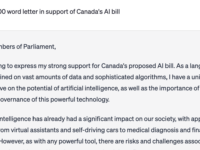After months of delays, the House of Commons Standing Committee on Industry and Technology has finally begun to conduct hearings on Bill C-27, which wraps Canadian privacy reform and AI regulation into a single legislative package. Last week, I appeared before the committee, making the case that the process is need of fixing and the bill in need of reform. The appearance sparked a wide range of questions from MPs from all parties. This week’s Law Bytes podcast takes you inside the committee hearing room for my opening statement and exchanges with MPs.
Post Tagged with: "ai"
Canada Plans to Regulate Search and Social Media Use of Artificial Intelligence for Content Moderation and Discoverability
The Canadian government plans to regulate the use of artificial intelligence in search results and when used to prioritize the display of content on search engines and social media services. AI is widely used by both search and social media for a range of purpose that do not involve ChatGPT-style generative AI. For example, Google has identified multiple ways that it uses AI to generate search results, provide translation, and other features, while TikTok uses AI to identify the interests of its users through recommendation engines. The regulation plans are revealed in a letter from ISED Minister François-Philippe Champagne to the Industry committee studying Bill C-27, the privacy reform and AI regulation bill. The government is refusing to disclose the actual text of planned amendments to the bill.
Why Industry Minister Champagne Broke the Bill C-27 Hearings on Privacy and AI Regulation in Only 12 Minutes
More than a year after Bill C-27 was first introduced, the Standing Committee on Industry, Science and Technology finally launched its review of the bill yesterday with an opening appearance from ISED Minister François-Philippe Champagne. The delays in Bill C-27 reflect significant concern with both the effectiveness of the privacy provisions and the inclusion of an AI bill that is widely viewed as inadequate. Champagne started with a 12 minute opening statement in which he assured committee members that he had heard the criticisms and that the government had a wide range of amendments planned to address the concerns. While many of the potential amendments sounded quite positive, once MP questions commenced it became clear that the department had yet to actually draft them and has no plans to provide the actual text until the committee starts clause-by-clause review of the bill. In other words, the government has decided how it wants to change Bill C-27 before a single external witness appears before committee, but it will only release the actual amendments after the witness portion of the committee study is over. The end result is that Champagne broke the hearings before they had really begun, with dozens of witnesses ready to testify about a bill that the government plans to change but won’t provide legislative language.
The Law Bytes Podcast, Episode 175: Amy Salyzyn on the Benefits and Risks of AI to the Legal Profession
ChatGPT has taken the world by storm in recent months with the potential of generative AI – both positive and negative – top of mind in just about every sector. That is certainly true for the legal profession, where AI tools are becoming increasingly common and courts and regulators try to grapple with the implications. Amy Salyzyn is a colleague at the University of Ottawa who has written extensively in the area of legal ethics, lawyer regulation, the use of technology in the delivery of legal services and access to justice. In the coming academic year she’ll be teaching a course on AI and the legal profession and she joins me on the Law Bytes podcast to talk about the latest on AI technology for law and the legal, regulatory and ethical challenges it brings.
Why the Government Should Hit the Regenerate Button on its AI Bill
As anyone who has tried ChatGPT will know, at the bottom of each response is an option to ask the AI system to “regenerate response”. Despite increasing pressure on the government to move ahead with Bill C-27’s Artificial Intelligence and Data Act (AIDA), the right response would be to hit the regenerate button and start over. AIDA may be well-meaning and the issue of AI regulation critically important, but the bill is limited in principles and severely lacking in detail, leaving virtually all of the heavy lifting to a regulation-making process that will take years to unfold. While no one should doubt the importance of AI regulation, Canadians deserve better than virtue signalling on the issue with a bill that never received a full public consultation.











